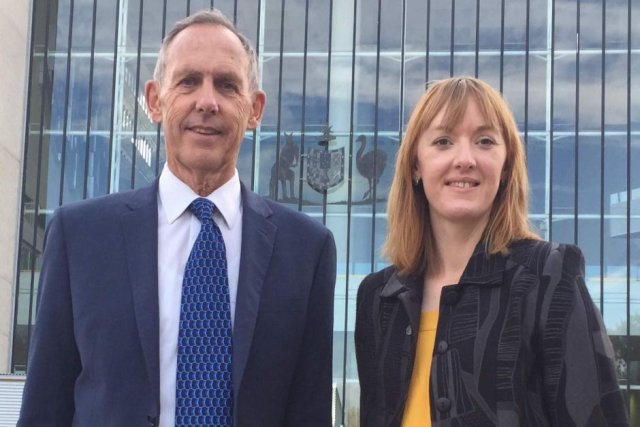
Former Greens leader Bob Brown and Hobart nurse Jessica Hoyt began a landmark High Court challenge to Tasmania's draconian anti-protest laws on May 2. The 2014 legislation allows police to stop protests before they even begin on business premises and access areas.
The two were arrested for peaceably protesting against the logging of the Lapoinya State Forest near Burnie on Tasmania’s north-west coast in January last year. Police dropped the charges against Brown and Hoyt after they began their High Court challenge.
They are claiming the Tasmanian government's laws, which provide for mandatory arrest, fines of up to $10,000 and jail sentences of up to four years for peaceful political protest, violate the implied constitutional right of every Australian to freedom of political communication.
They maintain that the laws threaten reasonable protest and, had they been in place before the peaceful Franklin Dam blockade by thousands of citizens in 1982–83, would have ensured the iconic Franklin River would now be dammed.
“We are concerned by government moves around Australia to take aim at environmentalists in particular because logging, mining and other resource extractors know they cannot win their argument fairly and squarely on the merits,” Brown said.
“In a world of rapid deterioration of the biosphere's ability to maintain life on Earth, this challenge is to reassert the right of Australians to document environmental loss and protest about it as a core part of our democratic tradition. The stakes are high.”
Brown said Tasmania had perfectly adequate laws to stop violence, destruction and other criminal behaviour inside and outside forests. "These laws aren't aimed at stopping that; they're aimed at peaceful people recording what's going on in forests and letting the rest of the public know.”
The Human Rights Law Centre is supporting the challenge. Its legal advocacy director Emily Howie said Tasmania’s laws are intended to shut down vital debate and prioritise business interests above the rights of protesters.
“It effectively prevents people from sharing political ideas, even in public spaces and even for just for a few minutes, if to do so would hinder a business activity. Businesses do not have any special right to be free from interruption. Governments cannot just sell off our democratic interests in order to protect business interests.”
The Tasmanian government has argued it is protecting businesses from political protests and did not restrict protests on land other than business premises. But Brown says this is nonsense, as the laws included “any area of the publicly-owned forests or, for that matter, rivers or beaches or anywhere in the public domain out in the open doors.
“These laws are to prevent the public knowing what’s going on behind the locked gates of forestry activities, specifically in Tasmania, which are destroying the habitat of rare and endangered species as well as magnificent forests,” he said.
The Commonwealth and all state governments except Western Australia's have intervened in the case to support the Tasmanian government.
Like the article? Subscribe to Green Left now! You can also like us on Facebook and follow us on Twitter.